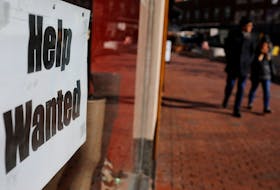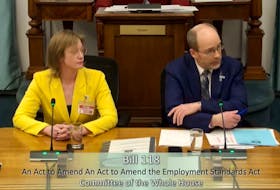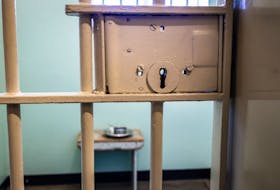WILLIAM’S HARBOUR, NL - It will be a particularly poignant moment when George Russell hits the hydro plant switch one last time. It will not only end the power supply to William’s Harbour, but usher an end to the place he has called home for over four decades.
George has worked at the plant since its dawning days in 1979. But when he arrives to work that Friday, he will be the man who darkens the outport’s street lights and sends the final volt of electricity through the remaining homes.
“When we turned on the power, my God that was great – everybody loved it,” George said. “Now this is going to be a different situation, it’s not going to be so happy of a moment.
“I’ll know this is going off, and it ain’t coming back on no more.”
Since late August, the community of William’s Harbour has been working to resettle its 26 residents. The area’s isolated location and aging population has made issues like transportation, health care and other resources increasingly difficult to access. Just this last winter, only a dozen of its residents remained in the area.
When resettlement was brought back to the table at the end of the summer, the town voted unanimously to move on.
“It wasn’t never forced by government, it was a voluntary decision by the people,” said George. “When the new budget came out, seems like everybody got on board and felt this was the time.”
Since he was 11, Clayton Curl has lived his life as a fisherman. He says the first time he came to William’s Harbour, he knew someday he’d make it his home. Curl spent the past thirty years living and fishing his boat out of the town.
But like much of the province, the moratorium devastated the area and the younger folk moved on for school and employment. With the closure of the fish plant in 1992, and the closure of the school in 2000, Curl says it became clear resettlement was the inevitable future for William’s Harbour.
“Once the school closed, I knew then it was only a matter of time,” he said.
One big family
In the final days leading up to the power shut off, only seven people remain. Besides Trevor Larkham, who is tending to his chickens and roosters before he sends them off to Port Hope Simpson, the Russell’s reside as the last family in the area.
While they were born in Rexon Cove, the Russell brothers invested most of their lives in William’s Harbour.
George and his wife Louise were married at the Anglican Church above the hillside stairs. George was also the last mayor, and remained the go-to contact for the town afterward.
Freeman and his wife Rosalind Russell ran the only business in town, a store next to their home that carries everything from groceries, tools, ski-doo parts and other necessities. Like George and Louise, Freeman and Rosalind are now moving on to Charlottetown.
Howard Russell and his son Bill are gathering their last things to bring across the ferry to a home in Port Hope Simpson.
Bertha Russell set off to her new home in Port Hope Simpson on Sunday.
“That’s the saddest part about it,” said Bill. “It’s one big family and they’re going to be separated.”
Howard was never fond of having to resettle. As his new house in Port Hope Simpson is being built, Howard is already hard at work ensuring he can keep his William’s Harbour property as a summer home.
“Had no choice but to go. What good would it be for me to stay here with no lights on and no payout,” said Howard, who turned 70 on Nov. 7. “But I’ll be back in the summer and in the fall for berry picking - I just got to get back.”
Known for its plentiful salmon, berries, and wild game like ducks, foxes and rabbits, William’s Harbour was an ideal residence for those who take joy in living off the land.
The town’s natural spring water has often been described as the best on the Labrador coast, and it will be dearly missed by all.
But with an aging population, the difficult task of getting to a hospital during times of sickness or emergency was strenuous. During the winter the only way out of William’s Harbour is via plane. With harsh winds and snowstorms common, weather is often not suitable for a plane to risk coming out.
Howard himself had a close call roughly ten years ago, when who awoke in the middle of the night with an aching pain in his chest. He soon realized he was having a heart attack, but the winds were too harsh for the plane to come down to rush him to hospital.
“The wind was blowing that hard, I was sure the plane was never going to come,” said Howard. “I called home and said, ‘Come over if you want to see me die, ‘cause with that state of it I’m not getting out of here’.”
After seven hours the wind died down enough for the plane to fly down and rush Howard to the hospital. For those long hours, Howard sat and waited at his kitchen table in agonizing pain - uncertain if the plane would ever arrive. Howard says the wait was that long he managed to smoke an entire pack of cigarettes.
Impact of Reg
Their brother Reg Russell passed away in 2015. He had been feeling unwell, and just as a boat to take him to hospital was leaving the William’s Harbour wharf he died of a sudden heart attack. It left a shattering mark on the family.
“When I wanted something done, Reg was always there for me,” said Howard. “When he died I wanted to leave; I almost did.”
Louise says Reg’s passing brought the issue of access to health care to the forefront of the community. It played a major role in the decision to resettle.
“When Reg died, it left a big impact on George,” Louise said. “He figured that was it then, it’s time to move on.”
Time restraints
Initially, the residents of William’s Harbour were given a deadline of Oct. 27 to find new homes and move out of the area before the electricity and running water were cut off. It was a date no one in the town approved of and it was soon extended to Nov. 10.
But with many heading to new homes that have hardly begun their construction phase, the time restraint has brought much frustration. The funding needed for the resettlement did not come through to the residents until less than two weeks before the November deadline.
Rosalind and Freeman felt particularly rushed having both a home and business to pack up. The couple purchased land in Charlottetown, NL, and have a small, one-level home currently being built. However, they are uncertain if it will be ready as late as Christmas for them to move in.
“They never gave us enough time, a couple months is nothing,” said Rosalind. “They should’ve given us till next spring, or at least told us earlier in the summer.
“It’s not easy, and on the coast there’s not too many homes to buy.”
For now they will move in with their daughter in Charlottetown, but her small apartment will keep them severely limited on what they can take. With their store alone, they had three refrigerators to move. As well as large items like ski-doo parts, many of which may have to be left behind.
Rosalind and Freeman ran their business for 30 years. But at 71 and 75-years old respectively, they do not have their sights on opening a new business anytime in the future.
“It seems sad to have a move away like this at this time in our lives. I don’t know if they realized how much work there was to it,” said Rosalind. “We got no choice now but to take what we need and leave the rest of it.”
With her sons arriving in town on their long liner boat, Rosalind and her husband will spend these final days gathering what they can as they leave behind a home and their way of making a living.
The future of William’s Harbour
Despite the abandoned vehicles and withering buildings now so prominent, William’s Harbour is not destined to be just another ghost town. Fueled largely by a love for the area, the town will remain in use in the hotter months. Like Howard, Louise and George plan to return each summer, and have already began rearranging for a summer home.
“We’ll be back in the summer, that’s what keeps us going,” said George.
Howard has plans to bar off his basement and bring in a wood furnace to make his William’s Harbour property more cabin like and suitable for the off the grid lifestyle.
It will be a different time for the community, with a greater dependence on generators, wood furnaces and gathering water from William’s Harbour’s natural spring. Although, for families like the Russell’s who grew up in the area, in many ways it will be like returning to childhood.
“We lived like that for years and years,” Howard reminisced. “We’ll miss the running water and that only because we let ourselves get use to it.”
After the power and running water are shut off on Nov. 10, the airstrip will be torn apart and its phone service tower taken down. These essentials of the modern world will be gone, but for those who cherish the self-sufficient and older ways of living, the resettlement by no means will be the end of William’s Harbour.
“I wish it could all be left for people who want to stay. But to tell the truth we were getting nowhere, we had no young people,” said Howard. “But I know I’ll be back here, and my grandkids love to come out here. So they’ll be back, they always come back.”
Related articles:
William’s Harbour residents waiting on government funding before building new houses








